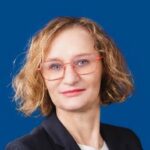2025 RSA Annual Conference Plenary Sessions and Speakers
For all information on the Plenary Session and Speakers for the 2025 RSA Annual Conference, please see below.
Wednesday 7th May 2025, 09.00-10.30
Opening Plenary – Navigating Regional Transformation
More information to follow
Prof. Elisa Ferreira was the European Commissioner for Cohesion and Reforms from 2019-2024. Before that, she was Vice Governor of the Bank of Portugal. During her tenure, she was Portugal’s representative on the Supervisory Board of the Single Supervisory Mechanism. Elisa was previously a Member of the European Parliament, coordinating for the Group of Socialists and Democrats in the EP’s Economic and Monetary (ECON) Committee and was rapporteur, co-rapporteur or shadow rapporteur of many key legislative files, including the ‘six-pack’ and ‘two-pack’, the Bank Recovery and Resolution Directive (BRRD) and the regulation creating the Single Resolution Mechanism. In Portugal, Elisa was a Member of the Portuguese National Parliament and Portugal’s Minister for Planning following her term as Portugal’s Minister for the Environment. She has also been Executive Vice President of the Porto Industrial Association, Vice President of Portugal’s Northern Region Coordination Commission and member of the Board of Portugal’s Statistics Authority. She has a degree in economics from the University of Porto, and a master’s degree and PhD from the University of Reading in the UK. She is a professor at the Faculty of Economics of the University of Porto (on leave of absence).

Pedro Conceição has been the Director of the Human Development Report Office and the lead author of the Human Development Report of the United Nations Development Programme (UNDP) since January 2019. Prior to this, Conceição served as the Director of strategic policy at the Bureau for Policy and Programme Support (from October 2014) and as the Chief Economist and the head of the Strategic Advisory Unit at the Regional Bureau for Africa (from December 2009). Before that, he was the Director of the Office of Development Studies (ODS) from March 2007 to November 2009 and the Deputy Director of ODS from October 2001 to February 2007. His work on financing for development and on global public goods was published by Oxford University Press in books he co-edited (‘The New Public Finance: Responding to Global Challenges’, 2006; ‘Providing Global Public Goods: Managing Globalization’, 2003). He has published on inequality, the economics of innovation and technological change, and development in, among other journals, the African Development Review, Review of Development Economics, Eastern Economic Journal, Ecological Economics, Environmental Economics and Policy Studies, Food Policy, and Technological Forecasting and Social Change.

Michaela Trippl is a Full Professor of Economic Geography at the University of Vienna, Austria. She was elected Fellow of the British Academy of Social Sciences (FAcSS) and Fellow of the Regional Studies Association (FeRSA) in 2021. Michaela’s research primarily centres on the geography of innovation and sustainability transitions, challenge-oriented innovation systems, green path development, and place-based transformative innovation and industrial policies. She has published numerous articles in major journals such as Progress in Human Geography, Economic Geography, Environment and Planning A and Regional Studies.

Zhiwu Wei is Leverhulme Trust and Issac Newton Trust Early Career Fellow at the Department of Land Economy, and Governing Body Fellow of Hughes Hall, University of Cambridge. He is also affiliated with Cambridge’s Lab of Interdisciplinary Spatial Analysis. His research applies big data, GIS, and causal inference methods to understand the causes and consequences of spatial inequality, as well as how technologies and regional development strategies shape spatial inequality.
Zhiwu received his Ph.D. in Land Economy from the University of Cambridge, his M.Sc. in Development Economics from Birmingham University, and his B.A. in Information Management and Information Systems from Renmin University of China. In the past, he was Occasional Research Officer at the International Inequalities Institute and the Department of Geography and Environment at the London School of Economics. He has worked and provided consulting services for international organizations including the OECD and the Asian Development Bank.
Zhiwu was raised by his elderly grandparents in a small rural village in southeastern China before being selected into a prestigious senior high school in the city. This early experience helps him get the start understanding of spatial inequality.

Mário Vale holds a PhD in Human Geography from the University of Lisbon. He is professor and chair of the Institute of Geography and Spatial Planning (IGOT) and a researcher at the Centre of Geographical Studies at the University of Lisbon. He was a Visiting Researcher at CURDS (Center for Urban and Regional Development Studies), University of Newcastle (2006) and a Fulbright Visiting Scholar at the Department of Geography of University of California Los Angeles (UCLA) (2013). He was the Director of the Centre of Geographical Studies -University of Lisbon from 2014 t0 2020. He is coordinator of the PhD programme in Geography at IGOT. His research interests are primarily concerned with the geography of innovation and regional development with a focus on peripheral areas. Currently, his research focuses digital platforms and spatial unevenness, regional sustainable transitions pathways, and left-behind areas development policies. He has published in Regional Studies, Cambridge Journal of Regions, Economy and Society, European Urban and Regional Studies, Geoforum, European Spatial Planning and others. His research has been underpinned by several national and international research projects (4th, 5th and 6th, Horizon 2020, Horizon Europe Framework Programs, ESPON, EEA Grants and FCT). He was President of the Portuguese Association of Geographers (2004-2008) and Vice-President of the Regional Studies Association (RSA) (2008-2011) and is currently FeRSA (Fellow of the RSA) and national representative of the association in Portugal. Since 2017, he is a member of the Board of the Regional Studies Association Europe.
Thursday 8th May 2025, 09.00-10.30
Plenary 2 – The Future of Regional Policy
More information to follow

Member of the Board of Cohesion and Development Agency (since 2013) with strong involvement on regional policy, territorial cooperation and monitoring and evaluation of public policies and on the negotiation of EU Cohesion Policy and its instruments (e.g. Partnership Agreements or Recover and Resilience Plan).
Portuguese delegate to the OECD Regional Development Policy Committee (since 2008) and the President of its Working Party on Territorial Indicators (2010-2017).
From previous professional career can be highlighted the following activities: Deputy Coordinator of the National Strategic Reference Framework Observatory, 2008-2013; Adviser of the Portuguese Secretary of State for Regional Development, 2005-2008; Head of the Territorial Statistics Unit in Portuguese Statistics Office, 1999-2005; Researcher of Regional and Urban Research Unit (CIRIUS) of School of Economics and Management – Lisbon University, 1996-2005.
In parallel, has developed teaching activities in the area of urban and regional economics in undergraduate courses and masters (Lisbon University) and has actively participated in various international fora on regional policy, as well as has been international expert in some OECD and European Commission projects.
Duarte Rodrigues has a degree on Economics (1996) and MSc/Master degree on Economics (1999), both by School of Economics and Management – Lisbon University, Portugal, and, more recently, has several specialisation courses on leadership and negotiation.

Renata Calak, PhD in Economics, Director of the Strategy Department in the Ministry of Funds and Regional Policy. She coordinates development policy, the process of preparing and monitoring development strategies, the implementation of development strategies, as well as the evaluation of European and national policies. She is responsible for strategic coordination of the Partnership Agreement, development of cohesion policy solutions in the 2014-2020 and 2021-2027 perspective, implementation and monitoring of regional and urban policy, within the framework of the National Regional Development Strategy 2030 and the National Urban Policy 2030, and the National Recovery Plan. She participated in the preparation of legal acts providing a framework for the effective absorption of Structural Funds and the Cohesion Fund, as well as national measures supporting regional development, such as the Act on the Principles of Development Policy. She coordinated work related to Poland’s Presidency of the Council of the EU in the field of cohesion policy. She participated in the preparation of a number of strategic documents at the national level, such as: the National Development Strategy 2007-2015, the National Regional Development Strategy 2010-2020, the National Spatial Management Concept 2030, the Strategy for Responsible Development, the National Regional Development Strategy 2030 and the National Urban Policy 2030

Raphael L’Hoest is Deputy Director General for Structural and Regional Policy in the Directorate General for Economic Policy of the German Federal Ministry for Economic Affairs and Climate Change (BMWK) in Berlin. He is an economist and holds a PhD from the University of Cologne, which he gained after research fellowships at Harvard and Cornell University, as well as a Master in Political Science from George Washington University. He entered public office in 1998 and has held multiple senior positions in economic, structural and financial policy that included service at the German embassies in Washington, D.C. and Bangkok, the Federal Chancellery in Berlin as well as the preparation of G8 summits. He is currently a member of the Supervisory Board of the German Federal Financial Services Supervisory Authority (BaFin) and also a member of the Board of trustees of the FIW (a German research institute focusing on competition issues), a Mercator Science-Policy Fellow at the Goethe-University in Frankfurt a.M. and a fellow of the “Atlantik Brücke”.

John Bachtler is a Professor in the European Policies Research Centre based at the University of Strathclyde, Glasgow and Delft University of Technology. His research principally involves comparative studies of regional and local development policies in Europe, including the design, implementation and evaluation of EU Cohesion Policy and the national regional policies of 30 European countries. He has been an expert adviser to numerous government departments in Europe, the European Parliament, European Commission, Committee of the Regions, European Court of Auditors, over 15 EU Council Presidencies, and the OECD. He is an Academician of the UK Academy of Social Sciences, Fellow of the Royal Society of Edinburgh, Fellow of the Regional Studies Association, and Board Member of RSA Europe.
Friday 9th May 2025, 12.45-14.15
Closing Plenary – Knowledge for Regional Transformation
More information to follow

Louise Kempton is Professor of Urban and Regional Policy in the Centre for Urban and Regional Studies (CURDS) at Newcastle University, UK. She has over 30 years’ experience as a researcher, policy maker and practitioner in local, regional and international economic development. Her current research is focused on the evolving understanding of the role of universities as ‘anchor’ institutions in local/regional economic growth and innovation, and the effects of place in shaping this role. She is also interested in the process of building local collaborative leadership to develop innovative solutions to meeting local policy challenges and opportunities. Louise has previously served as Associate Dean for Research and Innovation in Newcastle University’s Faculty of Humanities and Social Sciences (2019-2023). She is currently the CURDS Director-designate, taking over the role in February 2025.

Maribel Guerrero is an Associate Professor of Public Policy and Management at the School of Public Affairs and Global Center for Technology Transfer at Arizona State University.
Her expertise focuses on how universities can become more entrepreneurial and contribute to regional development. Her current research interests include the managerial and public policy implications of (academic) entrepreneurship, technology transfer, innovation, and entrepreneurial ecosystems. She is an Editor of the Small Business Economics Journal and Regional Studies Journal, an Associate Editor of the Journal of Technology Transfer, and a member of the Advisory Board of Research Policy and Technology Forecasting and Social Change.
She is an active research fellow involved in outstanding global projects measuring entrepreneurship, innovation, and ecosystems: the Global Entrepreneurship Monitor (GEM), Panel Studies of Entrepreneurial Dynamics (PSED), and the Global University Entrepreneurial Spirit Students’ Survey (GUESSS). Through these and other projects, she has supported multiple actors, including ecosystem builders, policymakers, scholars, educators, entrepreneurs, and investors, who are engaged in the dynamic processes of technology transfer and science policy across geographical scenarios. She is currently the President of the Technology Transfer Society.
Regarding scholarly productivity and impact, according to Google Scholar, her citation count is 18227 (h-index: 58). She was ranked in the top 3% of academics worldwide in Business and Management, according to the AD Scientific Index 2024, and listed in the top 2% of the world’s scientists by Stanford Elsevier 2024.
Joana Resende is the Vice-Rector of University of Porto for Strategic Planning, Knowledge Valorization and Entrepreneurship. She is also an Associate Professor at the Faculty of Economics and Management of U.Porto. She is the President of U.Porto Science and Technology Park (UPTEC) and the local coordinator of the European Alliance for Global Health (EUGLOH) at University of Porto. She is also a member of the General Council of INESC-TEC (Institute for Systems and Computer Engineering, Technology and Science). From 2017-2020, she was a member of the Board of Directors of Cef-up (Center for Economics and Finance at University of Porto).
She holds a PhD in Economics and Management Science from Université Catholique de Louvain (joint degree with U.Porto). Her main research areas are industrial organization and digital economics. She is particularly interested in investigating business models and competitive dynamics allowed by new generation digital technologies allowing firms to engage in price and product personalization strategies. She has taken part in multiple national and international scientific projects. At the present moment, she is the local Coordinator (at U.Porto) of the European Alliance for Global Health (EUGLOH) and the local coordinator of the EUGLOHRIA project (funded by H2020 – Swafs). She is also the Principal Investigator of the project New Business Models in the Digital Age: Theory and Applications (funded by the Portuguese Science Foundation).
Her research has been published in leading international economic journals, including The Rand Journal of Economics, Management Science, Marketing Science, Journal of Economics and Management Strategy, Economic Theory, International Journal of Industrial Organization, Journal of Mathematical Economics, Journal of Economic Dynamics and Control, Information, Economics & Policy, Journal of Public Economic Theory. Over time, she has acted as consultant for both private and public entities, in the areas of competition policy, regulation and energy markets